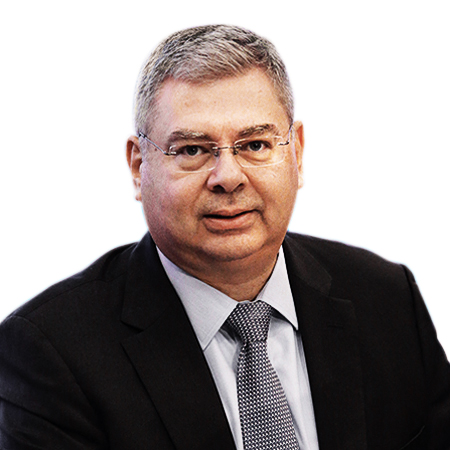2019 has been a transition year for the Group, with a number of business and organizational challenges. Regarding the environment in which we operate, the Group had to manage, for the first time after several years, a severe deterioration in the international environment, as well as the biggest change in the refining industry over last 20 years regarding the marine fuels specifications. In such a backdrop, we responded very successfully, improving our balance sheet and maintaining high returns for our shareholders.
In 2019, we updated our strategy, taking advantage of organizational changes to accelerate initiatives we had already taken, focusing on improving competitiveness, as well as growth in new activities that will improve our environmental footprint by 50% until 2030.
New Strategy
In the last two years, after a long period focusing on leveraging the investments that we made between 2007 and 2013, as well as improving our balance sheet, significant progress was recorded in designing a sustainable development program for the Group and, at the same time, upgrading Corporate Governance, improving environmental performance and advancing the digital transformation agenda.
In 2019, we announced our new growth strategy; based on three pillars, as a key tool enabling the Group to realize our vision to play a leading role in energy transition, develop a diversified portfolio in the energy sector, maximising returns for our shareholders.
Specifically, the first pillar concerns improving our core business, through a series of ongoing initiatives in digital transformation, energy efficiency and operational excellence across all of our activities.
The second focuses on selected, high-return investments in refining and petrochemicals, as well as the development of an international trading platform. Through these actions, we make even more use of the existing investments and the production units of the Group.
Finally, the third pillar concerns further strengthening our energy and natural gas portfolio, creating a substantial presence in the renewable energy sources industry, maximizing the value of our hydrocarbon exploration and production portfolio and exploring new technologies for energy production. Combined, the above will allow us to achieve our goal of improving our environmental footprint by 50% until 2030.
Over the last few months, we proceeded with a number of initiatives directed towards swiftly implementing our strategy, with progress in governance and organizational issues, through adapting the Company's Articles of Association, as well as reorganizing business activities and our management team.
The agreement with the HRADF regarding the value maximisation of our participation in DEPA was finalised and approved by the GM; furthermore, an agreement for the acquisition and construction of the largest renewable energy sources park in Greece, with an effective tariff, which is lower than system energy prices per MWh, was concluded.
Our vision is to facilitate the energy transition by maximizing returns in our core businesses and developing a diversified energy portfolio
refining environment
2019 was a year of significant challenges for the global refining industry. Crude oil prices, although lower on average vs. 2018, rose during the year, mainly due to reduced supply from OPEC countries and Russia. In addition, Eastern Europe and the Mediterranean was disrupted in the first half of 2019 by issues on the supply infrastructure of Russian crude oil. Finally, the transition to the new marine fuel specifications at the end of the year resulted in increased volatility and weaker cracks for main products. The above had a particularly negative impact on benchmark refining margins, with HELPE’s system benchmark margin down by $1.6/bbl (-36% vs 2018).
Finally, in the 4Q19, we successfully completed the Aspropyrgos refinery’s transition to the new IMO operating model, which enabled the supply of new, clean and high quality marine fuels in Greek ports from the end of 2019, while the planned full turnaround at the Elefsina refinery was safely completed.
balance sheet improvement
The Group's Adjusted EBITDA for 2019 amounted to €572 million, with the corresponding Net Income at €185 million. The financial results are particularly satisfactory, considering the decline in international refining margins - to the lowest levels since 2013 - as well as the heavier refining maintenance program during the year (planned reduced production by 7%), which negatively affected profitability. In addition, crude supply and operational optimisation, as well as the good performance in marketing partially offset the negative impact of international refining backdrop and reduced utilisation.
The issue of a new €500 million Eurobond with an interest rate of 2%, the lowest interest rate for the Group in at least 10 years, which also opened the international bond markets for other Greek companies, was another milestone for 2019. Combined with the partial refinancing of the 2021 bond and the repayment of the €325 million notes in 3Q19, as well as the improvement in commercial terms of bank facilities, we significantly reduced our financial cost, which has decreased by over 40% in three years.
Those above developments allowed the Company’s Board of Directors to propose the 2019 regular dividend to remain at the same levels of 2018, totaling €0.50/ share for FY19.
We aim to improve our environmental footprint by 50% until 2030
The main event of the first months of 2020 has, without a doubt, been the Coronavirus pandemic, which has negatively impacted international economic activity, oil industry and the capital markets. Although the full effects of the pandemic cannot be assessed just yet, it is expected that they will have a negative impact on the refining industry, given the expected decline in motor fuels demand compared to last year, for the first time since 2009, which is estimated to be significant. In addition, the oil producing countries’ agreement to reduce crude oil supply, following the large demand drop, was another important development in 2020, which is expected to significantly affect the global energy industry overall.
We are ready to respond to these challenges with our strong balance sheet, framework and risk management policies, as well as our extensive experience in dealing with crises. In the first months of the crisis, we have experienced unprecedented disruptions in the national and global economy, as well as in the international the energy industry. Our main priorities are the safety of our staff and contractors in our facilities, the smooth operation and supply of the market, as well as ensuring liquidity, so that we can both successfully overcome the current situation, as well as plan for the future, taking advantage of the opportunities that will arise. As management team, we have already developed alternative scenarios and their impact on the operation of the Group in order to adjust our planning for the year and our strategy, where required. HELLENIC PETROLEUM Group personnel has demonstrated the ability to respond to difficult conditions, providing optimism for the future.
footprint improvement
Operating safely with respect for the environment is our top priority, with the objective of continuous improvement. In 2019, we were able to maintain very good safety standards, thereby improving the Group’s key indices compared to our European peers, while the improvement in our environmental footprint continued for yet another year, as reflected in the relevant indices.
The above would not of course be possible without the support of our main stakeholders. We would like to thank our customers for their trust, our shareholders for their continuous support, but also the Group’s employees, who, with their continuous efforts, contributed to another successful year.











